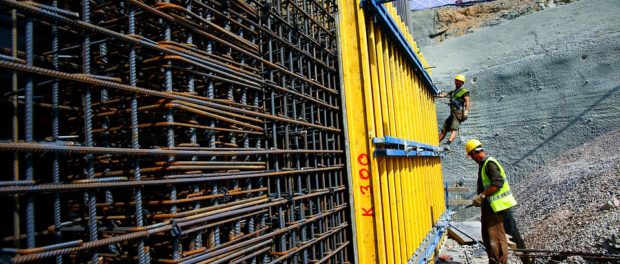Construction industry growth dips despite rise in new orders

New figures have revealed growth in the UK’s construction sector slowed in December despite new orders rising at their fastest pace since May.
The latest IHS Markit/CIPS UK Construction Purchasing Managers’ Index (PMI) posted 52.2 in December, down slightly from 53.1 in November but above the 50.0 no-change threshold for the third month running, indicating a moderate expansion of overall output at the end of 2017.
Respondents indicated an uneven recovery in business activity at the end of the year, with a robust rise in residential building in tandem with falling work on commercial projects and stagnating civil engineering output.
House building remained a key factor of industry growth, with work expanding for the 16th consecutive month in December. However, the data indicated a fall in commercial construction, contributing towards the downward trend seen since July. In addition, a three-month period of decline in civil engineering work ended as the sector stabilised.
Firms also reported a resilient demand for new construction projects in December, showcased by the fastest upturn in new order volumes in the last seven months. Anecdotal evidence cited an improved flow of enquires in recent months, alongside a gradual upturn in clients’ willingness to commit to new work.
Employment and purchasing activity also increased as a result of the prospect of greater workloads, with the latest upturn in input buying at its steepest for two years linked by respondents to increased business requirements. Robust demand for construction products and materials contributed to another sharp lengthening of suppliers’ delivery times at the end of 2017.
However, strong cost pressures continued across the sector, boosted by rising prices for a range of inputs. Firms noted higher prices for blocks, bricks, insulation and roof tiles, alongside continued rises in the cost of imported products. Although the rate of input cost inflation picked up since November, it remained softer than February’s peak.
Looking to the future, firms indicated a subdued degree of optimism regarding the business outlook for the next 12 months. The balance of companies expecting a rise in output levels remained among the weakest recorded since mid-2013, which survey respondents mainly linked to worries about the wider UK economic outlook.
Duncan Brock, Director of Customer Relationships at the Chartered Institute of Procurement & Supply, said the sector “offered little in terms of comfort” at the end of 2017, despite the increased pace of new business and the rise in purchasing activity.
“The housing sector was the strongest performer again and materials for residential building were in greater demand fuelling longer delivery times, shortages of key materials and sharper input cost rises.
“It appears that the continued fall in commercial activity was testament to Brexit-related uncertainty on the horizon and the sector’s fear about the direction of the UK economy as clients still hesitated to spend on bigger projects.
“Business optimism was subdued at levels not seen since 2013, but the improvement in new order growth in December contributed to the biggest surge in job creation since June. Construction firms still anticipated future new work, in spite of the climate of continued uncertainty and wanted to ensure that skilled talented people were in place should the New Year offer more success than expected.”
